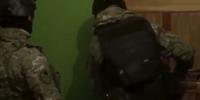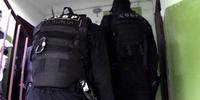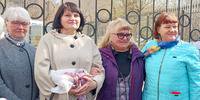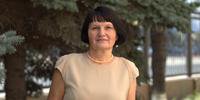The Case of Mikhaylenko in Chelyabinsk
Filter
- #
- #
Alexander Chepenko, investigator of the Investigative Committee of the Russian Federation for the Chelyabinsk Region, who initiated almost all cases against Jehovah's Witnesses in the region, separates materials from the case of Pavel Popov regarding Irina Mikhailenko, Vadim Gizatulin and Olga Zhelavskaya into separate proceedings.
The believers are suspected of "deliberately participating in the activities of a banned local religious organization of Jehovah's Witnesses ... in the form of participation in religious meetings ... and also carried out preaching work among the inhabitants of Chelyabinsk and the Chelyabinsk region."
- #
Based on the results of the review of the materials, investigator Chepenko initiates a separate criminal case against Mikhailenko, Gizatulin and Zhelavskaya.
The decision to initiate the case states, among other things, that the believers "acted from religious motives" and participated in "collective worship, consisting in successive performances of songs ... and praying to Jehovah God, studying and discussing articles and religious texts."
The guilt of Irina Mikhailenko and Olga Zhelavskaya, according to the investigation, also lies in the fact that they received fellow believers at home.
- #
Irina Mikhailenko's home is searched, after which the security forces take the believer with her husband and son away for interrogation by the Investigative Committee. Earlier, in March 2019, this family had already been searched as part of a criminal case against Valentina Suvorova.
Olga Zhelavskaya is in the hospital after COVID-19 and a stroke. On this day, searches are carried out in the homes of Vadim Gizatulin and Irina Mikhailenko.
- #
The investigator prosecutes Mikhailenko and Gizatulin as defendants under Part 2 of Article 282.2 of the Criminal Code.
Among other things, Mikhailenko is accused of attending an international religious congress in South Korea in 2019.
- #
Specialists conducting additional comprehensive psychological, linguistic and religious expertise admit that in the materials received from meetings of believers, "no signs of incitement of enmity, hatred (discord) towards a group of persons distinguished on the basis of gender, race, nationality, language, origin, attitude to religion, membership in any social group were found."
- #
Investigator Oleksandr Chepenko prosecutes Irina Mikhailenko as accused of participating in the activities of an extremist organization. According to the investigation, the believer is guilty of "directly participating and personally speaking in those convened and organized by V.N. Suvorov. religious meetings." One of the "proofs" of her guilt is the fact that she and other believers who gathered in her house for joint prayer and Bible reading, "had signs of cohesion, unity of purpose," "common interests and goals."
- #
It becomes known that the case of Vadim Gizatulin and Olga Zhelavskaya was separated from the case of Mikhailenko into a separate proceeding.
- #
Irina Mikhailenko's case is submitted to the Metallurgicheskiy District Court of the city of Chelyabinsk. It will be considered by judge Lyudmila Blagodyr.
- #
The court examines prosecution witnesses. A neighbor of the defendant says that she did not see her offer any literature and that Mikhailenko did not communicate with her on religious topics. The witness did not hear any extremist statements from the defendant. Only "a couple of times I saw her in the entrance with a woman and with a sweet roll in her hands." In general, she characterizes Irina Mikhailenko positively. After the prosecutor read out her preliminary testimony, the woman reports that she did not give such testimony, she signed some pages without reading, and some are not her signature.
An operative is being interrogated, who says that the defendant provided her apartment for meetings with fellow believers and reading the Bible. Although the preliminary testimony of the witness was detailed, now he cannot answer most of the questions, citing a poor memory.
The judge and prosecutor deny the next witness the right not to testify against himself and his loved ones, after which he says that he attended the services of Jehovah's Witnesses, where video recordings of reports on spiritual topics were played. He saw the defendant at the meetings, but does not remember when it happened.
The fourth prosecution witness is being questioned via videoconference. She says that she attended the services of Jehovah's Witnesses twice and saw the defendant at them. The woman says that she has never heard from Irina calls for breaking off family relations or undermining the constitutional order and security of the state.
- #
Another neighbor of the defendant is being questioned in court. She has known her since 1995 - when she moved into the house where Irina lives. The Witness says that until about 2018 she saw the literature of Jehovah's Witnesses in the mailbox, but never took it or read it. When asked by the defendant how the witness understood that these were the publications of Jehovah's Witnesses, she says that this was evident from the fact that they were about God.
- #
Another neighbor of the defendant is summoned to court for questioning. According to him, before the arrival of law enforcement officers, he did not know that Mikhailenko professes the religion of Jehovah's Witnesses. He characterizes the defendant positively, he has never heard calls for the overthrow of the constitutional order or for the rupture of family relations from her. After the announcement of his preliminary testimony from 2019, he states that he could not provide such information, since he did not have it. He says that he could not read the interrogation protocol himself, the investigator read the text to him. The witness partially confirms the testimony from 2022.
- #
Another prosecution witness is being questioned in court. The man now lives in another region, so the interrogation takes place via video conferencing. He says he attended worship services of Jehovah's Witnesses long before 2017. The witness says that at the meetings the believers studied the Bible. He did not make monetary donations, recruit new members or call for the condemnation of other religions. After the announcement of his preliminary testimony for 2019, he clarifies that he was talking about Jehovah's Witnesses in general, and not about a specific religious group in Chelyabinsk. He refutes some testimonies. For example, he says that he did not donate money, although the protocol states the opposite.
- #
Approximately 20 people gather outside the courthouse to support the defendant. Some of them manage to attend the meeting as listeners.
The prosecutor reads out the case materials from volumes 10 to 20.
- #
Interrogation of two defense witnesses. The first witness, co-founder of the law firm, has known Irina Mikhailenko since 1989. She gives her a positive characterization and notes that Irina always respects other people, she has many friends, excellent relationships with all relatives and colleagues. Everyone who knows Irina speaks of her as a simple kind woman who never called for a break in family relations or refusal of medical care.
The Witness says that many of her acquaintances are Jehovah's Witnesses, and none of them behaves arrogantly towards representatives of other religions, does not teach them or persuade them to study the Bible. She also never heard the defendant or other Jehovah's Witnesses acquaintances speak negatively about the authorities or try to persuade her or others to engage in extremist activities.
The witness also informs the court that she has not seen the defendant give anyone any religious literature for more than 8 years. She recalls that sometimes someone asked Irina to give them something to read, and she brought them magazines with stories about animals and nature, with stories about the lives of different people. In these magazines, according to the witness, there was "absolutely nothing calling for extremism."
The second witness for the defense, a former colleague of Irina, gives the defendant an extremely positive characteristic: "A good person, a very fair leader, never brushed off her subordinates, took care of them, helped at work. A caring mother, a good wife, a good housewife, her family priorities were and are in the first place, she pays great attention to her children, their upbringing, spiritual and physical development.
The witness notes that Irina has no bad habits, and during their long acquaintance she did not utter a single abusive word. The witness did not delve into what exactly Irina believed, but she knew that she did not celebrate some holidays. Also, the defendant never talked about the LRO, her position there or dignity.
Further, the witness tells a story from his personal life: a few years ago she had such a difficult relationship with her husband that they decided to divorce. When she told Irina about this, she advised her to save the 15-year marriage, and not destroy it, try to talk to her husband and resolve the conflict. Thanks to this, the woman was able to save the family, and she is very grateful to Mikhailenko for this.
The witness also says that Irina was the first person who strongly advised her to go to the doctors when she was diagnosed with serious health problems. Later, she was diagnosed with diabetes, and she was able to get qualified help in time.
There were no appeals for power from Irina. As the witness notes, "Irina is generally out of politics."
- #
At the court session, a defense witness, another former colleague of the defendant, is interrogated. She informs the court that she has never heard from Irina calls for any religious activity, refusals of medical care or extremist statements. On the contrary, women of two different faiths have been united by friendly ties since 1988. The witness says that in the 1990s, Mikhailenko gave her religious literature that "contained quotations from the Bible and interpretation, stories about nature." However, she never encouraged her to change her religion or invited her to any religious meetings.
The defendant reads out her written notes. Irina says that the room where she is now being tried was previously her office. For many years she worked in the field of jurisprudence, communicating with colleagues with similar professional interests. However, this did not bring her satisfaction from life, she did not feel truly happy. And when Irina began to study the Bible, she gained valuable knowledge, which helped her improve her character and establish relationships with people.
The defendant reads excerpts from articles that tell about the times of Hitler's Germany. At that time, Jehovah's Witnesses were slandered and wanted to be destroyed. The defendant draws an analogy with the present criminal case and shows the absurdity of the accusations against her. Therefore, Irina considers criminal prosecution to be nothing more than persecution for faith.
- #
The prosecutor asks to send Irina Mikhailenko to a general regime colony for 4 years, and then restrict her freedom for 10 months.
- #
Irina Mikhailenko makes her last word and asks the court to acquit her. The judge retires to the deliberation room for sentencing. The announcement is scheduled for April 25.
The last word of the defendant Irina Mikhailenko in Chelyabinsk - #
- #



